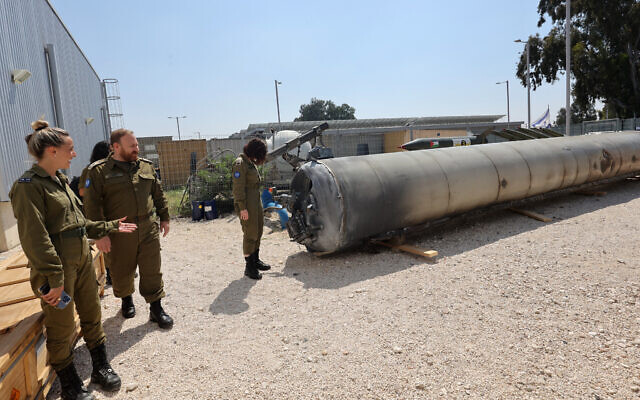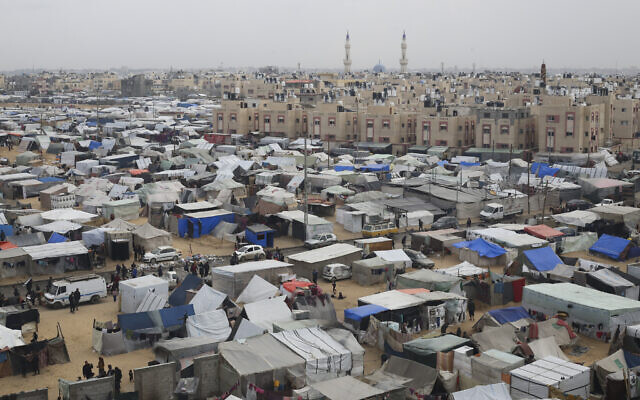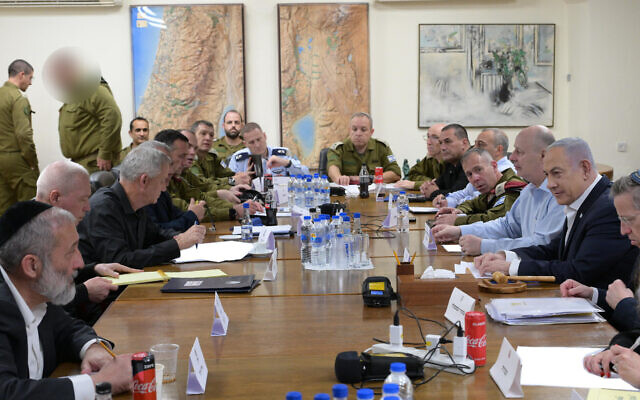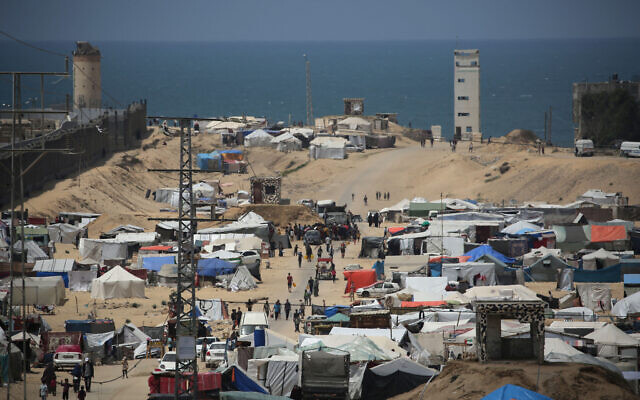PM shelved pre-approved plans for immediate Iran reprisal after Biden call — report
Source pledges Israel will respond to Iranian attack, though not as initially planned, since ‘diplomatic sensitivities won out’; ABC says Israeli response unlikely before Passover

Prime Minister Benjamin Netanyahu shelved plans that had been prepared for retaliation against Iran’s weekend barrage after speaking with US President Joe Biden immediately following the attack, Israeli television reported Wednesday.
According to the Kan public broadcaster, the cabinet had already approved a series of possible responses depending on the scope of the Iranian attack, which were slated to be carried out immediately following the Iranian fusillade early Sunday.
“The response won’t be what was planned any longer; diplomatic sensitivities won out,” a senior source was quoted telling the broadcaster. “There will be a response, but it seems it will be different from what was planned.”
The report noted the comments likely pointed to a weaker response than what had been approved.
Kan also quoted unnamed Western diplomats saying that “the understanding is that Israel will respond.”
The Ynet news site reported that most of the Israeli leadership and military brass supported an attack on Iran in response, but some were opposed, led by Shas leader Aryeh Deri, who spoke out on Wednesday against allowing the situation to escalate.
Iran launched more than 300 missiles, drones, and rockets at Israel over the weekend, saying it was retaliation for an allegedly Israeli strike on April 1 on a site in Damascus that Iran said was a consular building, which killed two Islamic Revolutionary Guard Corps generals and several other officers. Nearly all of the Iranian projectiles fired at Israel were intercepted, and there was little damage.

A separate report Wednesday by the Axios news site said the war cabinet also considered greenlighting a strike on Iran during a meeting Monday, but later decided against it, “for operational reasons.” According to the report, which cited Israeli and US officials, Israel informed the Biden administration after the meeting that it had decided to hold off on a response.
“We are not sure why and how close it was to an actual attack,” a US official was quoted as saying.
Israel now appears unlikely to carry out a strike on Iran before the end of Passover, a US official told ABC News while acknowledging the timing could change.
The Jewish holiday begins Monday evening and runs through April 30.
The network also quoted Israeli sources saying Israel twice readied for and then dropped plans to strike Iran this week, in response to the Islamic Republic’s missile and drone attack.
Meanwhile, Egyptian officials told a Qatari outlet that the US has accepted Israel’s plan for an operation in the southern Gaza city of Rafah, in return for not carrying out a large strike in Iran.
“The American administration showed acceptance of the plan previously presented by the occupation government regarding the military operation in Rafah, in exchange for not carrying out a large-scale attack against Iran,” an unnamed official told Al-Araby Al-Jadeed.

The Egyptian officials told the outlet that preparations are underway so that Egypt can deal with any possible impact of the planned operation.
A US National Security Council spokesperson denied the report and said such a plan has never been discussed.
Israel is battling in Gaza against the Palestinian terror group Hamas which led a devastating October 7 cross-border attack on Israel that killed 1,200 people, mostly civilians.
The military offensive aims to destroy Hamas, replace its de facto regime in Gaza, and free 253 hostages of all ages who were abducted from Israel and taken as captives into Gaza during the terror group’s assault.
Four Hamas battalions are believed to be stationed in Rafah along with over a million civilians sheltering there after fleeing fighting in other parts of the Strip. Rafah is also thought to be where Hamas leaders are hidden, possibly along with Israeli hostages.
Netanyahu has several times claimed to have approved plans for a Rafah operation and more recently said that a date has been decided for the launch. However, the Rafah operation faces strong international opposition, including from the US, over the possibly high civilian casualties it may incur. The population of Rafah and its environs has swollen to around 1.2 million people, including hundreds of thousands of displaced Gazans who fled fighting in other areas of the enclave.
The reports came ahead of expected meetings Thursday of the war cabinet and the high-level security cabinet. Ynet said deliberations would likely focus on a possible response to the Iranian attack, the moribund talks with Hamas for a hostage deal and Gaza truce, and fighting with Hezbollah in the north.
The war cabinet has already met several times since the Iran to discuss a response, amid international pressure for restraint.

Meanwhile, Brig. Gen. Doron Gavish, the former commander of Israel’s air defense who is now serving in reserves, said Wednesday that the air force was preparing for future attacks from Iran, with Tehran threatening an immediate response should Israel retaliate.
He said the Israeli Air Force has been reviewing its successful defense against Iran’s attack over the weekend as it makes adjustments for potential additional fighting.
“We are preparing ourselves for the next time, debriefing the mission and seeing how could we prepare ourselves for the next attack,” Gavish said from a military base in southern Israel.
Agencies contributed to this report.









